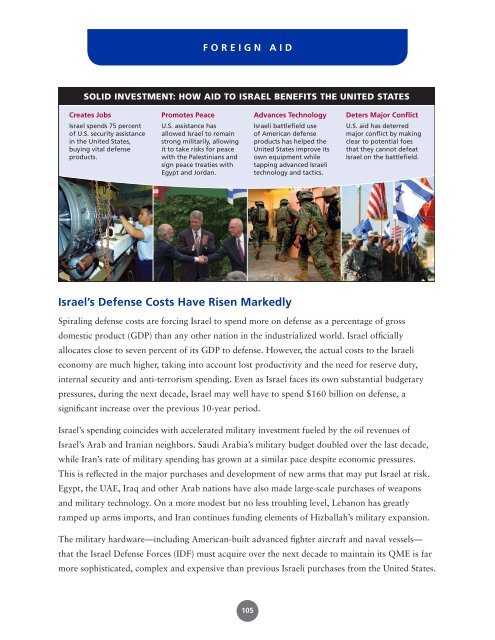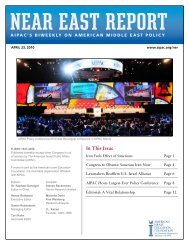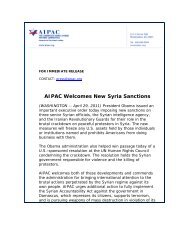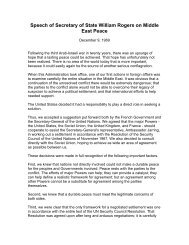2013 Briefing Book - Print Version - Aipac
2013 Briefing Book - Print Version - Aipac
2013 Briefing Book - Print Version - Aipac
You also want an ePaper? Increase the reach of your titles
YUMPU automatically turns print PDFs into web optimized ePapers that Google loves.
FOREIGN AID<br />
SOLID INVESTMENT: HOW AID TO ISRAEL BENEFITS THE UNITED STATES<br />
Creates Jobs<br />
Israel spends 75 percent<br />
of U.S. security assistance<br />
in the United States,<br />
buying vital defense<br />
products.<br />
Promotes Peace<br />
U.S. assistance has<br />
allowed Israel to remain<br />
strong militarily, allowing<br />
it to take risks for peace<br />
with the Palestinians and<br />
sign peace treaties with<br />
Egypt and Jordan.<br />
Advances Technology<br />
Israeli battlefield use<br />
of American defense<br />
products has helped the<br />
United States improve its<br />
own equipment while<br />
tapping advanced Israeli<br />
technology and tactics.<br />
Deters Major Conflict<br />
U.S. aid has deterred<br />
major conflict by making<br />
clear to potential foes<br />
that they cannot defeat<br />
Israel on the battlefield.<br />
Israel’s Defense Costs Have Risen Markedly<br />
Spiraling defense costs are forcing Israel to spend more on defense as a percentage of gross<br />
domestic product (GDP) than any other nation in the industrialized world. Israel officially<br />
allocates close to seven percent of its GDP to defense. However, the actual costs to the Israeli<br />
economy are much higher, taking into account lost productivity and the need for reserve duty,<br />
internal security and anti-terrorism spending. Even as Israel faces its own substantial budgetary<br />
pressures, during the next decade, Israel may well have to spend $160 billion on defense, a<br />
significant increase over the previous 10-year period.<br />
Israel’s spending coincides with accelerated military investment fueled by the oil revenues of<br />
Israel’s Arab and Iranian neighbors. Saudi Arabia’s military budget doubled over the last decade,<br />
while Iran’s rate of military spending has grown at a similar pace despite economic pressures.<br />
This is reflected in the major purchases and development of new arms that may put Israel at risk.<br />
Egypt, the UAE, Iraq and other Arab nations have also made large-scale purchases of weapons<br />
and military technology. On a more modest but no less troubling level, Lebanon has greatly<br />
ramped up arms imports, and Iran continues funding elements of Hizballah’s military expansion.<br />
The military hardware—including American-built advanced fighter aircraft and naval vessels—<br />
that the Israel Defense Forces (IDF) must acquire over the next decade to maintain its QME is far<br />
more sophisticated, complex and expensive than previous Israeli purchases from the United States.<br />
105








